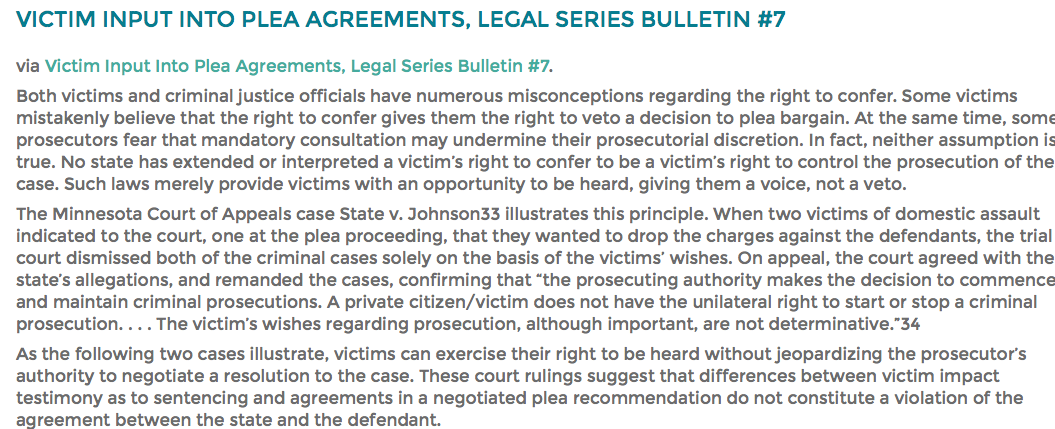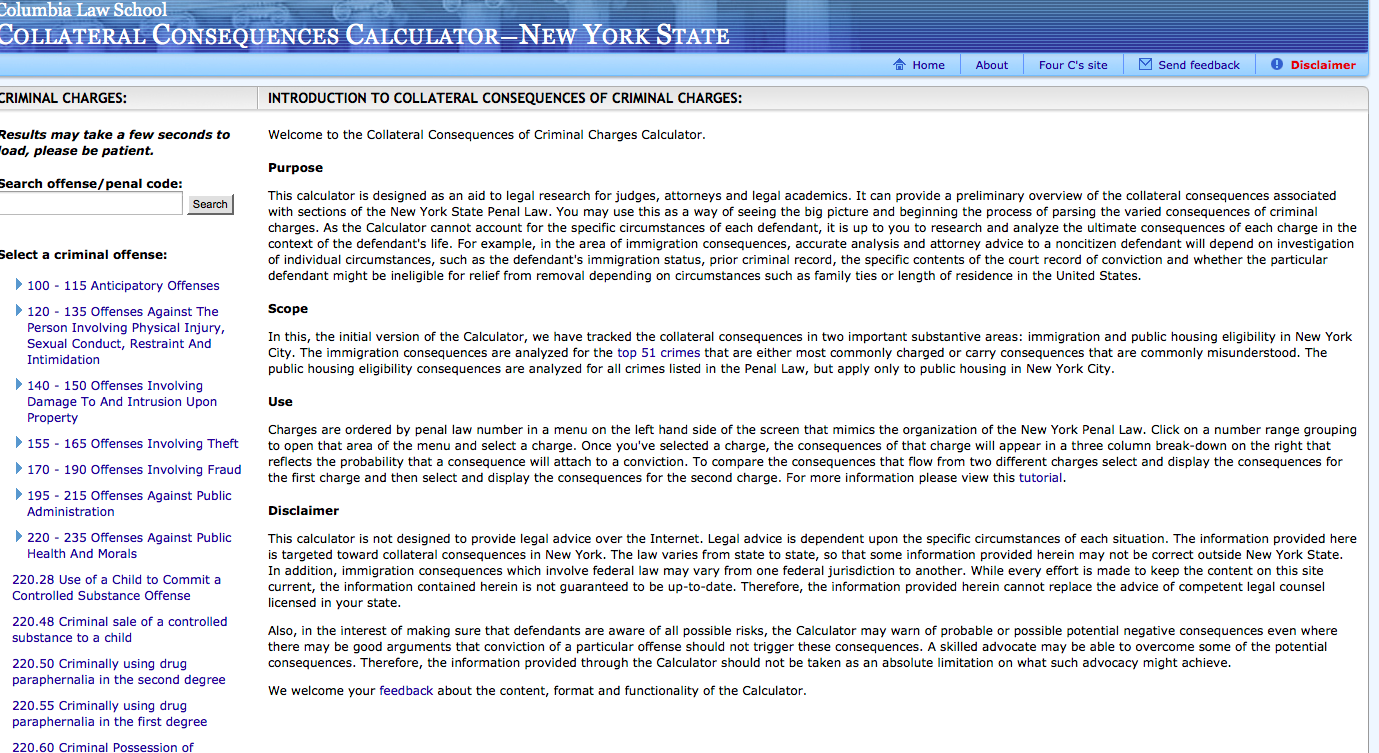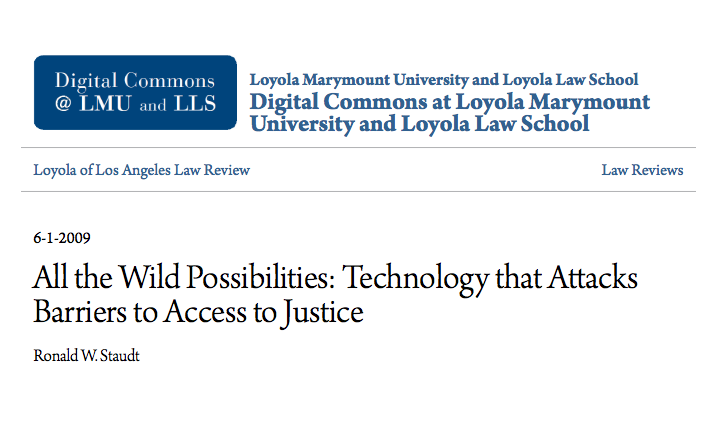via Victim Input Into Plea Agreements, Legal Series Bulletin #7.
Both victims and criminal justice officials have numerous misconceptions regarding the right to confer. Some victims mistakenly believe that the right to confer gives them the right to veto a decision to plea bargain. At the same time, some prosecutors fear that mandatory consultation may undermine their prosecutorial discretion. In fact, neither assumption is true. No state has extended or interpreted a victim’s right to confer to be a victim’s right to control the prosecution of the case. Such laws merely provide victims with an opportunity to be heard, giving them a voice, not a veto.
The Minnesota Court of Appeals case State v. Johnson33 illustrates this principle. When two victims of domestic assault indicated to the court, one at the plea proceeding, that they wanted to drop the charges against the defendants, the trial court dismissed both of the criminal cases solely on the basis of the victims’ wishes. On appeal, the court agreed with the state’s allegations, and remanded the cases, confirming that “the prosecuting authority makes the decision to commence and maintain criminal prosecutions. A private citizen/victim does not have the unilateral right to start or stop a criminal prosecution. . . . The victim’s wishes regarding prosecution, although important, are not determinative.”34
As the following two cases illustrate, victims can exercise their right to be heard without jeopardizing the prosecutor’s authority to negotiate a resolution to the case. These court rulings suggest that differences between victim impact testimony as to sentencing and agreements in a negotiated plea recommendation do not constitute a violation of the agreement between the state and the defendant.
In Sharp v. Missouri, 35 the prosecutor, in the course of plea bargaining, had agreed to remain silent on the subject of sentencing. One of the victims, who was also the mother of the three other victims, was invited to make an impact statement to the court, pursuant to Missouri Code § 557.041, in which she included a request for the maximum sentence. The court proceeded to sentence the defendant to a total of 16 years on four counts. After sentencing, the defendant filed a motion to withdraw his guilty plea on the grounds that the victim’s request for the maximum sentence in her impact statement breached the terms of the plea agreement whereby the prosecutor would make no recommendation as to the defendant’s sentence. The court denied the motion, concluding that no evidence had been submitted to establish that the state’s agreement to remain silent as to sentencing also applied to the victim and that nothing in the victim’s impact statement purported to be the views of the prosecutor, the state, or anyone other than herself and her family.
The Vermont Supreme Court’s ruling was similar.36 In that case, the court rejected a plea agreement as being too lenient after hearing the victims’ impact testimony. The court held that the prosecutor’s questioning of victims about the impact of the crime during sentencing proceedings did not violate the plea agreement, even though the victims, in the course of questioning, requested a harsher sentence than that agreed to in the plea recommendation.
These cases indicate that victim impact statements can influence the court’s decision to accept or reject a plea. Also, consulting with the victim throughout plea bargain discussions allows prosecutors to incorporate the victims’ concerns before presenting a plea proposal to the court. Furthermore, this inclusion may enhance the probability that the plea agreement will meet with judicial approval.
In addition, education can significantly reduce misunderstanding. Explaining to a victim how the criminal justice process works at the outset of the case, including the circumstances that might lead to a plea bargain, can help prevent unrealistic victim expectations. Victim/witness coordinators in prosecutors’ offices can help victims understand their consultation rights, including any related limitations, and their use is essential to maximizing the benefit victims receive from conferring with prosecutors. Also, victim service professionals can help victims prepare and submit impact statements that are useful to both the prosecutor and the court throughout the plea bargaining process.
For prosecutors and judges, familiarity with the workings of victim impact and consultation laws provides for smooth implementation of these laws. Articulating the victim’s views on a proposed plea agreement to the court in a victim’s absence encourages a prosecutor to actively listen to the concerns and objections of a victim rather than simply notifying or informing a victim after an agreement has been reached. At the same time, prohibiting judges from accepting a plea agreement unless the victim’s views have been made known and notification requirements have been met promotes enforcement of crime victims’ rights.
Relatively little case law addresses enforcement of a victim’s right to provide input for a negotiated plea. Laws of many states specifically prohibit remedial action for noncompliance with victims’ rights provisions or state that failure to observe such rights shall not be grounds to change a sentence.37 In addition, victims may lack standing to seek enforcement of their rights.
The holding in a recent Rhode Island case illustrates the effect of this prohibition.38 Despite the fact that the victims in the case had both a constitutional and a statutory right to present victim impact testimony before the state accepted a plea agreement, the defendant negotiated and entered a plea to a reduced charge without the victims’ knowledge. Only after the victims retained counsel to investigate and pursue a civil claim on their behalf did they discover that the criminal case had been resolved without an opportunity for the victims to address the court. The victims brought a suit against the state and the town for failure to notify them of their rights and the pending criminal case and for monetary damages. On appeal, the Supreme Court of Rhode Island denied their claim, stating that “in order for a cause of action for damages to resonate from the deprivation of a crime victim’s rights, the legislature must create specific provisions or mechanisms as mandated by the framers.”39 By enacting a statute that states, “Failure to afford the victim of a felony offense any of the rights established by this chapter shall not constitute grounds for vacating an otherwise lawful conviction, or for voiding an otherwise lawful sentence or parole determination,” the Rhode Island General Assembly declined to create a remedy for crime victims whose rights have been violated.40
In addition to compliance certification procedures, states can use other creative means to ensure that victims’ voices are heard throughout the plea bargaining process. Arizona has experimented with a rule permitting judges to participate in plea negotiations.41 The rule also clearly defines a victim’s role in the plea bargaining process, even permitting victims to be present and heard during any settlement discussions attended by the defendant. In any case, the rule requires the prosecutor to confer with the victim and inform the court about the victim’s position; in addition, it states that the court must consider the victim’s views in deciding whether to accept or reject the negotiated plea.


